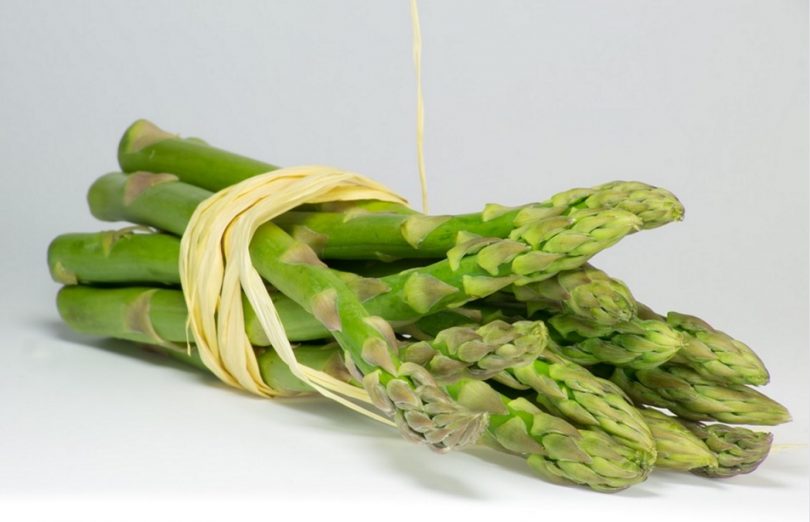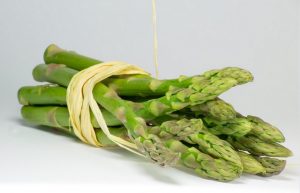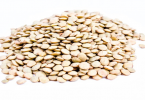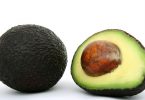Today’s question: can dogs eat asparagus? Is asparagus good or bad for dogs? Scroll down for detailed answers.
The nutritious benefits of asparagus are no secret, and you probably know already that it is an excellent vegetable to add to your meals. Whether you grill it, roast it or add it to pasta, the deep flavors of asparagus can be a good source of important nutrients. Asparagus looks similar to celery but has a different texture, taste, and use. The lean, green, stalk like veggie is a nutritional powerhouse that can be used in such a variety of ways, even the least skilled cook can enjoy the veg.
While most everyone likes asparagus in some way, shape, or form, there are also those who wish to share their love of asparagus with a friend. Perhaps even a furry friend. If asparagus is often on your dining table in some form or the other, you may be tempted to offer some to your dog. But before you do so, you need to find out can dogs eat asparagus?
Can Dogs Eat Asparagus?
The good news is that asparagus is not harmful for dogs. However, as dogs are mainly carnivorous, you should not feed your dog too much asparagus. It is safe to feed cooked or uncooked versions of this vegetable to your dog, but when cooked, it is easier for the dog to digest it. Most often, doctors and nutritionists recommend not cooking veggies if you are attempting to ingest the full amount of nutrition. Once veggies are steamed or cooked, the heat releasing many vitamins. Cooking asparagus is important before giving it to a dog though, because asparagus becomes quite soft and with a wiggly disposition, making the veggie easy to chew and swallow by a dog. A pup given a full stalk of asparagus may run the risk of choking on it due to the firm stance of the stalk. Cooking may release many nutrients, but at least the cooking will not cause choking.
One of the great aspects of asparagus is the dietary fiber. The dietary fiber packed into this nutritious vegetable makes it very good for regular bowel movements. If you are working towards helping your dog lose a few pounds or retain a weight loss, asparagus is very beneficial. When waste is able to move through the body at a normal rate, the body is able to process other foods more quickly while raising the metabolism. Another added benefit of a strong digestive system is creating a strong immune system eager to flush out toxins. Asparagus can help relieve waste, weight, and toxins from the body of your dog all while keeping your dog from going hungry.
If you have just put your dog on a diet, he is likely to feel hunger during the initial few weeks. The additional fiber in asparagus will help your pet feel fuller. A dog on a diet does not know why he is on a diet and may be more prone to snatching food off the counter or accepting table scraps. If you offer your dog asparagus, and the dog happily eats it, the pup may be less prone to eating all the food in sight or becoming a beggar.
Additionally, asparagus has been connected by doctors to reduced risks of acquiring some diseases, including joint pain, joint inflammation and cancer. The strong antioxidants found in asparagus enable it to fight these disorders. One specific antioxidant, glutathione is particularly effective for combating free radicals which cause cell damage and lead to inflammation, arthritis and cancer. While these studies were conducted by doctors on people, the human and animal are very similar in body make up. We have similar bodies and cell functions, which would make one think we would have a similar reaction to vitamins and nutrients.
As all this research has been conducted on people, we do not know for sure how true it is for dogs. As a dog owner, you must be vigilant to watch your dog for any potential side effects of introducing a new food. On the other hand, you may also watch for any tell tale improvements in your pet that will correlate to the studies doctors have completed upon people. While we cannot speak with a dog and know for sure how they are feeling and if the asparagus makes their joints feel better in the morning, we can still safely say that asparagus will not harm your dog.
Over and above all purposes of feeding your dog people food, the idea is to do no harm. As long as the food is not poisonous or inclined to cause choking, blockages, and bloat, then any type of food is ok to offer. However, as dogs are for the most part meat-eaters, they may or may not gain as much benefit from asparagus as you do. You may like asparagus and enjoy the nutritional benefit, but a body of a dog is designed to eat and process meat. A dog needs proteins and meats for his daily intake of vitamins. Whether you wish he ate more veggies is more of a personal concern rather than a medical concern.
How To Prepare Asparagus For Your Dog
You may give your dog cooked or raw asparagus; however, as the dog’s digestive process is mainly designed to digest meat, uncooked vegetables are likely to be difficult to digest. Too much of a food that is difficult for dogs to digest is likely to cause stomach ache, gas, vomiting or diarrhea. More often than not, veggies left uncooked with go straight through the digestive system without even having been processed. In these instances, there is no point in offering the veggie to the dog in the first place if the veggie is never even broken down. Always cook the asparagus before offering to your dog to ensure absorption of some minerals and a purpose for the snack. Also remember to offer slowly and in moderation to ensure the digestive system is able to handle the change in food.
Once it has been cooked properly, asparagus is easier for your dog to digest. If you are preparing asparagus for your own meal and usually feed your dog off your plate, you need to take certain precautions. This is because the elements that you may add to enhance the flavor and taste of your food are often unnecessary and perhaps even harmful for a dog. These include oil, butter, onion, garlic, etc. and your dog should not eat food made using these ingredients. Powdered onion, garlic and ginger are even more harmful for dogs than their natural forms. Butter, oil and margarine are fats and can cause unusual weight gain for your dog in addition to causing inflammation of the pancreas in dogs.
The best way to cook asparagus for your dog is to steam or boil it. Make sure that you do not throw away the water as several important nutrients may be wasted.
Some Negative Effects Of Asparagus
Asparagus is surely healthy and safe for dogs to eat; however, too much of it is likely to cause harm. Offer only a small serving of the vegetable to your dog and add other elements, such as meat.
It is common knowledge that asparagus gives an odd odor to the urine and a different color to the stool. This is also true for dogs. If you have fed your dog asparagus and your dog’s urine smells comparatively pungent, do not become worried. Additionally, the stool may turn green after a somewhat larger serving of this vegetable.
If your dog’s digestive system appears to be disturbed due to the asparagus, you must discontinue immediately. Feed your pet regular dog food and he will recover after the asparagus is out of his system.
Additional condiments and ingredients are also likely to cause digestive issues for your dog. When wishing to cook veggies for your dog, you may find that doing so while you cook makes the process easier and more efficient. This process will become easier, but your pup’s veggies should be cooked separate from your own to curb any chance of cross contamination. The most efficient and safe method is to steam a bit of the vegetable in a separate pan, while you prepare yours as per your taste.
The asparagus plant is not safe for your dog and is likely to cause severe discomfort. If you have an asparagus patch in your garden, be careful that your dog does not wander into it on the sly. The good thing about asparagus is that the plant is easy and convenient to grow-allowing you easy access to the nutrition and taste. However, if you have easy access, your dog may have easy access as well. Attempt to corner off the asparagus so your dog does not dig the plant out and eat until his/her heart is content. If this were to happen, your dog could become very sick and uncomfortable. S/he will not die or be at risk of poison, but the discomfort and the mess may be uncontrollable.
Be sure to keep an eye on your dog every time s/he is outside and you have a garden of veggies. The dog may going on a feeding frenzy the second you turn your back. The only way to prevent this from occurring is to fence the garden and/or keep an eye on your dog outside at all times.
Conclusion
To conclude this discussion, the answer to the initial question is yes, dogs can eat asparagus but in moderate quantities and in line with the points discussed here. If you have not given your dog asparagus before, do not give too much suddenly. Give a little bit first and then observe your dog for the next few hours. If you observe any negative reaction, discontinue right away.
References:
https://www.vetinfo.com/vets/answers/can-dogs-eat-asparagus-or-asparagus-toxic-for-dogs
http://www.mothering.com/forum/347-pets/1073809-do-not-feed-your-dog-asparagus.html









Hi there,
Thank you for your article. It’s highly informative. But it would be also noteworthy to add that asparagus fern must be avoided at all cost. Ingesting this would lead our dogs to have stomach ache or worse, vomiting.